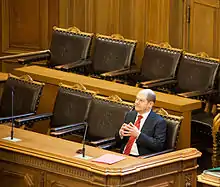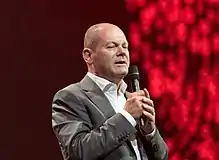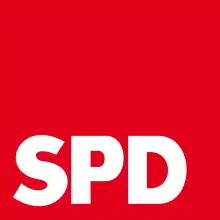Olaf Scholz
Olaf Scholz (German pronunciation: [ˈoːlaf ˈʃɔlts]; born 14 June 1958) is a German politician serving as Federal Minister of Finance and Vice Chancellor under Chancellor Angela Merkel since 14 March 2018. He served as First Mayor of Hamburg from 7 March 2011 to 13 March 2018 and Acting Leader of the Social Democratic Party (SPD) from 13 February to 22 April 2018.
Olaf Scholz | |
|---|---|
.jpg.webp) Scholz in 2018 | |
| Vice Chancellor of Germany | |
| Assumed office 14 March 2018 | |
| Chancellor | Angela Merkel |
| Preceded by | Sigmar Gabriel |
| Minister of Finance | |
| Assumed office 14 March 2018 | |
| Chancellor | Angela Merkel |
| Preceded by | Wolfgang Schäuble |
| Deputy Leader of the Social Democratic Party | |
| In office 13 November 2009 – 6 December 2019 Serving with Manuela Schwesig, Natascha Kohnen, Malu Dreyer, Thorsten Schäfer-Gümbel and Ralf Stegner | |
| Leader | Sigmar Gabriel Martin Schulz Andrea Nahles |
| Preceded by | Frank-Walter Steinmeier |
| Succeeded by | Hubertus Heil |
| Leader of the Social Democratic Party Acting | |
| In office 13 February 2018 – 22 April 2018 | |
| General Secretary | Lars Klingbeil |
| Preceded by | Martin Schulz |
| Succeeded by | Andrea Nahles |
| First Mayor of Hamburg | |
| In office 7 March 2011 – 13 March 2018 | |
| Deputy | Dorothee Stapelfeldt Katharina Fegebank |
| Preceded by | Christoph Ahlhaus |
| Succeeded by | Peter Tschentscher |
| Leader of the Social Democratic Party in Hamburg | |
| In office 6 November 2009 – 24 March 2018 | |
| Preceded by | Ingo Egloff |
| Succeeded by | Melanie Leonhard |
| In office 2000–2004 | |
| Preceded by | Jörg Kuhbier |
| Succeeded by | Mathias Peterson |
| Minister of Labour and Social Affairs | |
| In office 21 November 2007 – 27 October 2009 | |
| Chancellor | Angela Merkel |
| Preceded by | Franz Müntefering |
| Succeeded by | Franz Josef Jung |
| Chief Whip of the Social Democratic Party in the Bundestag | |
| In office 13 October 2005 – 21 November 2007 | |
| Leader | Peter Struck |
| Preceded by | Wilhelm Schmidt |
| Succeeded by | Thomas Oppermann |
| Secretary General of the Social Democratic Party | |
| In office 20 October 2002 – 21 March 2004 | |
| Leader | Gerhard Schröder |
| Preceded by | Franz Müntefering |
| Succeeded by | Klaus Uwe Benneter |
| Senator for the Interior of Hamburg | |
| In office 30 May 2001 – 31 October 2001 | |
| First Mayor | Ortwin Runde |
| Preceded by | Hartmuth Wrocklage |
| Succeeded by | Ronald Schill |
| Member of the Bundestag | |
| In office 22 September 2002 – 10 March 2011 | |
| In office 27 September 1998 – 30 May 2001 | |
| Personal details | |
| Born | 14 June 1958 Osnabrück, West Germany |
| Political party | Social Democratic Party |
| Alma mater | University of Hamburg |
| Signature |  |
| Website | Official website |
A member of the Bundestag from 1998 to 2001 and again from 2002 to 2011, Scholz was Minister of the Interior of Hamburg under First Mayor Ortwin Runde from May to October 2001 and general secretary of his party under chairman and chancellor Gerhard Schröder from 2002 to 2004. He served as Federal Minister of Labour and Social Affairs in Merkel's first Grand Coalition from 2007 to 2009 and leader of the SPD in Hamburg from 2000 to 2004 and again from 2009 to 2018.
Together with former Brandenburg state representative Klara Geywitz, he received most votes in the first round of the 2019 election for the newly introduced dual leadership of his party,[1] but lost with 45% in the ensuing run-off to the winners Norbert Walter-Borjans and Saskia Esken.[2]
On 10 August 2020, the SPD party executive nominated him as its chancellor candidate for the 2021 federal election in Germany.
Early life and education
Born in the northwestern city of Osnabrück, Scholz grew up in Hamburg's Rahlstedt district and studied at the University of Hamburg to become a lawyer specializing in labour law.[3]
Political career
A former vice president of the International Union of Socialist Youth, Scholz represented Hamburg Altona in the Bundestag between 1998 and 2001 as well as between 2002 and 2011. From May to October 2001, he was Minister of the Interior (Innensenator) of Hamburg under First Mayor Ortwin Runde and from 2002 to 2004 he was Secretary-General of the SPD; he resigned from that office when Chancellor Gerhard Schröder, facing disaffection within his own party and hampered by persistently low public approval ratings, announced that he would step down as chairman of the Social Democratic Party.[4]
Scholz served as the SPD parliamentary group's spokesperson on the inquiry committee investigating the German Visa Affair in 2005. Following the federal elections later that year, he served as First Parliamentary Secretary of the SPD parliamentary group. In this capacity, he worked closely with the CDU parliamentary floor manager Norbert Röttgen to manage and defend the grand coalition led by Chancellor Angela Merkel in parliament.[5] He also served as member of the Parliamentary Oversight Panel (PKGr), which provides parliamentary oversight of Germany's intelligence services BND, MAD and BfV. In addition, he was a member of the parliamentary body in charge of appointing judges to the Highest Courts of Justice, namely the Federal Court of Justice (BGH), the Federal Administrative Court (BVerwG), the Federal Fiscal Court (BFH), the Federal Labour Court (BAG), and the Federal Social Court (BSG).
Scholz succeeded Franz Müntefering as Federal Minister of Labour and Social Affairs in the first cabinet of Chancellor Angela Merkel, when Müntefering left office in November 2007.[6][7]
Following the 2009 elections, Scholz served as deputy chairman of the SPD parliamentary group. Between 2009 and 2011, he served on the group's Afghanistan/Pakistan Task Force.[8] In 2010 he also participated in the annual Bilderberg Meeting in Sitges, Spain.[9]
First Mayor of Hamburg, 2011–2018



On 20 February 2011 the Social Democrats led by Scholz won the 2011 Hamburg state election with 48.3% of the votes, resulting in 62 out of 121 seats in the Hamburg Parliament.[10] Scholz resigned as a member of the seventeenth Bundestag on 11 March 2011 shortly after his election as First Mayor; Dorothee Stapelfeldt, also a Social Democrat, was made Deputy First Mayor.
In his capacity as mayor, Scholz represented Hamburg and Germany internationally. On 7 June 2011, Scholz attended the state dinner hosted by President Barack Obama in honor of Chancellor Angela Merkel at the White House.[11] As host of Hamburg's annual St. Matthias' Day banquet for the city's civic and business leaders, he has invited several high-ranking guests of honour to the city, including Prime Minister Jean-Marc Ayrault of France (2013), Prime Minister David Cameron of the United Kingdom (2016), and Prime Minister Justin Trudeau of Canada (2017).[12] From 2015 until 2018, he also served as Commissioner of the Federal Republic of Germany for Cultural Affairs under the Treaty on Franco-German Cooperation.[13]
In 2013, Scholz opposed a public initiative aiming at a complete buyback of energy grids Hamburg had sold to utilities Vattenfall Europe AG and E.ON decades before; he argued this would overburden the city, whose debt pile stood at more than 20 billion euros at the time.[14]
Scholz participated in the exploratory talks between the CDU, CSU and SPD parties to form a coalition government following the 2013 federal elections.[15] In the subsequent negotiations, he led the SPD delegation in the financial policy working group; his co-chair from the CDU/CSU was Finance Minister Wolfgang Schäuble.[16] Alongside fellow Social Democrats Jörg Asmussen and Thomas Oppermann, Scholz was considered a possible successor to Schäuble in the post of finance minister at the time.[17]
In a paper compiled in late 2014, Scholz and Schäuble proposed redirecting revenue from the so-called solidarity surcharge on income and corporate tax (Solidaritätszuschlag) to subsidize the federal states’ interest payments.[18]
Under Scholz’ leadership, the Social Democrats handily won the 2015 state elections in Hamburg, receiving around 47 percent of the vote.[19] His coalition government with the Green Party – with Green leader Katharina Fegebank serving as Deputy First Mayor – was sworn in on 15 April 2015.
In 2015, Scholz led Hamburg's bid to host the 2024 Summer Olympics at an estimated budget of 11.2 billion euros ($12.6 billion), competing against Los Angeles, Paris, Rome and Budapest;[20] the citizens of Hamburg, however, later rejected the candidacy in a referendum, with more than half voting against the project.[21]
In 2015, Scholz – alongside Minister-President Torsten Albig of Schleswig-Holstein – negotiated a restructuring deal with the European Commission that allowed the German regional lender HSH Nordbank to offload 6.2 billion euros in troubled assets – mainly non-performing ship loans – onto its government majority owners and avoid being shut down, saving around 2,500 jobs.[22]
Federal Minister of Finance, 2018–present
On 14 March 2018, Olaf Scholz became Federal Minister of Finance.[23]
Within the first months in office, Scholz became one of Germany's most popular politicians with an approval rating of close to 50 percent.[24]
Political positions
Within his party, Scholz is widely regarded as part of the "conservative wing."[3]
After the 2017 national elections, Scholz was publicly critical of party leader Martin Schulz’s strategy and messaging, releasing a paper titled “No excuses! Answer new questions for the future! Clear principles!” With his proposals for reforming the party, he was widely interpreted to position himself as a potential challenger or successor to Schulz within the SPD. In the weeks after his party first started weighing a return to government, Scholz urged compromise and was one of the SPD members more inclined toward another grand coalition.[25]
Since taking office as minister of finance, Scholz has been committed to a continued goal of no new debt and limited public spending.[24] In 2018, he suggested the creation of a Europe-wide unemployment insurance system to make the eurozone more resilient to future economic shocks. He also wants to introduce a financial transaction tax.[26]
Other activities
International organizations
- European Bank for Reconstruction and Development (EBRD), ex-officio member of the board of governors[27]
- European Investment Bank (EIB), ex-officio member of the board of governors (since 2018)[28]
- European Stability Mechanism, member of the board of governors (since 2018)[29]
- Asian Infrastructure Investment Bank (AIIB), ex-officio member of the board of governors (since 2018)[30]
- International Monetary Fund (IMF), ex-officio alternate member of the board of governors[31]
Corporate boards
- KfW, ex-officio member of the Board of Supervisory Directors (since 2018)[32]
- RAG-Stiftung, ex-officio member of the board of trustees (since 2018)
- HafenCity Hamburg GmbH, ex-officio chairman of the supervisory board (–2018)
- Hamburger Marketing Gesellschaft mbH (HMG GmbH), ex-officio chairman of the supervisory board (–2018)
Non-profits
- Stiftung Lebendige Stadt, member of the board of trustees (since 2009)
- Deutsche Nationalstiftung, member of the Senate[33]
- Deutsches Museum, member of the board of trustees
- Friedrich Ebert Foundation (FES), member[34]
- Hamburg Leuchtfeuer, member of the board of trustees
- Herbert and Elsbeth Weichmann Foundation, member of the board of trustees
- Übersee-Club, member of the board of trustees
- ZDF, member of the board of directors
- German Council on Foreign Relations (DGAP), chairman of the Task Force on International Aviation Policy[35]
- Food, Beverages and Catering Union (NGG), member
- ZDF, member of the Television Board (2002–2010)
- Policy Network, member of the board (2002–2007)
Controversy
When Die Tageszeitung interviewed Scholz, then serving as secretary general of the ruling SPD, during a 2003 party conference, he later demanded massive changes and threatened to pull the entire piece. When the editors said they would go ahead and publish it without authorization, Scholz warned that the paper would be excluded from all future SPD background talks.[36] The newspaper published the interview with all of Scholz's answers blacked, and the paper's editor-in-chief Bascha Mika condemned his behavior as a "betrayal of the claim to a free press, a betrayal of the journalist's self-definition, a betrayal of the reader."[37]
Scholz was criticized for his handling of the riots that took place during 2017 G20 summit in Hamburg. Mayor Scholz apologized to residents, but refused to resign.[3]
Personal life
Olaf Scholz is married to Britta Ernst (born 1961); they have no children. She is also a politician (SPD).
The couple lived in Hamburg's Altona district before moving to Potsdam in 2018.[38]
References
- Madeline Chambers (26 October 2019). "Germany's Scholz tops SPD leader vote, but faces run-off". Retrieved 7 February 2020.
- Deutsche Welle, ed. (30 November 2019). "Germany's Social Democrats throw coalition with Merkel into doubt". Retrieved 8 February 2020.
- Guy Chazan (9 February 2018). "Olaf Scholz, a sound guardian for Germany's finances". Financial Times. Retrieved 25 December 2020.
- Richard Bernstein (7 February 2004), New York Times.
- Sebastian Fischer (13 November 2007), Müntefering Resignation: Merkel Loses 'Mr. Grand Coalition' Spiegel Online.
- Andreas Cremer and Brian Parkin, "Muentefering, Vice-Chancellor Under Merkel, Quits", Bloomberg.com, 13 November 2007.
- "Merkel defends record as Germany's tense governing coalition hits 2-year mark", Associated Press, 21 November 2007.
- Olaf Scholz SPD Parliamentary Group.
- Official Bilderberg Meeting Website Archived 17 June 2010 at the Wayback Machine
- AICGS Coverage of the 2011 Land Elections Archived 16 March 2011 at the Wayback Machine
- Expected Attendees at Tonight's State Dinner Office of the First Lady of the United States, press release of 7 June 2011.
- Josh Wingrove (17 February 2017), Trudeau Stresses Fair Wages, Tax Compliance in Warning to Europe Bloomberg News.
- Scholz Bevollmächtigter für deutsch-französische Kulturzusammenarbeit Die Welt, 21 January 2015.
- Nicholas Brautlecht (23 September 2013), Hamburg Backs EU2 Billion Buyback of Power Grids in Plebiscite Bloomberg News.
- Arne Delfs and Patrick Donahue (30 September 2013), Germany Sets Coalition Talks Date as Weeks of Bartering Loom Bloomberg News.
- Patrick Donahue (28 October 2013), Merkel Enters Concrete SPD Talks as Finance Post Looms Bloomberg News.
- Rainer Buergin and Birgit Jennen (20 September 2013), Schaeuble Seen Keeping Finance Post Even in SPD Coalition Bloomberg News.
- Rainer Buergin (4 March 2015), Merkel Weighs End of Reunification Tax for East Germany Bloomberg Business.
- Caroline Copley (15 February 2015), Merkel's Conservatives Suffer Blow in State Vote, Eurosceptics Gain New York Times.
- Hamburg mayor: our Olympics will cost $12.6bn, less than London 2012 The Guardian, 8 October 2015.
- Karolos Grohmann (29 November 2015), Hamburg drops 2024 Games bid after referendum defeat Reuters.
- Arno Schuetze and Foo Yun Chee (27 May 2015), HSH Nordbank strikes rescue deal with EU Reuters.
- NDR. "Nachrichten aus Hamburg". www.ndr.de.
- Michael Nienaber (29 May 2018), Germany's 'miserly' Scholz irks comrades at home and abroad Reuters.
- Emily Schultheis (5 January 2018), 8 key players in Germany’s coalition talks Politico Europe.
- Myriam Rivet and Michael Nienaber (10 June 2018), France, Germany still split on eurozone reforms, French official says Reuters.
- Board of Governors European Bank for Reconstruction and Development (EBRD).
- Board of Governors European Investment Bank (EIB).
- Board of Governors: Olaf Scholz European Stability Mechanism.
- Board of Governors Asian Infrastructure Investment Bank (AIIB).
- Members International Monetary Fund (IMF).
- Board of Supervisory Directors and its Committees KfW.
- Senate, Deutsche Nationalstiftung.
- Members Friedrich Ebert Foundation (FES).
- Study Groups, Discussion Groups and Task Forces German Council on Foreign Relations.
- Moritz Schuller (7 September 2003), The right to revise The Guardian
- Ben Knight (19 January 2016), Time to end interview authorization in Germany? Deutsche Welle
- Ildiko Röd (25 June 2018), Vizekanzler ist Neu-Potsdamer Märkische Allgemeine.
External links
![]() Media related to Olaf Scholz at Wikimedia Commons
Media related to Olaf Scholz at Wikimedia Commons
| Party political offices | ||
|---|---|---|
| Preceded by Franz Müntefering |
Secretary General of the Social Democratic Party 2002–2004 |
Succeeded by Klaus Uwe Benneter |
| Preceded by Martin Schulz |
Leader of the Social Democratic Party Acting 2018 |
Succeeded by Andrea Nahles |
| Political offices | ||
| Preceded by Franz Müntefering |
Minister of Labour and Social Affairs 2007–2009 |
Succeeded by Franz Josef Jung |
| Preceded by Christoph Ahlhaus |
First Mayor of Hamburg 2011–2018 |
Succeeded by Peter Tschentscher |
| Preceded by Sigmar Gabriel |
Vice Chancellor of Germany 2018–present |
Incumbent |
| Preceded by Peter Altmaier Acting |
Minister of Finance 2018–present | |

